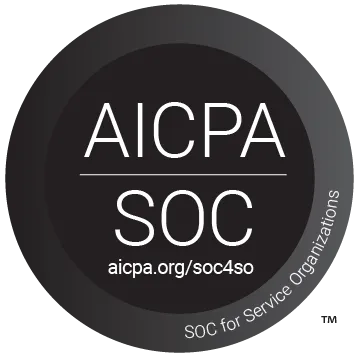A Complete Guide to UNFI Cash Application and Deductions
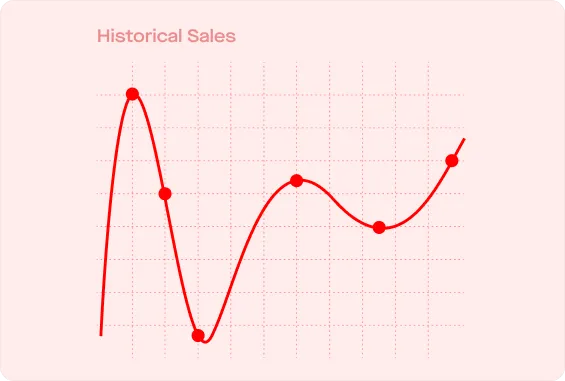


A Complete Guide to UNFI Cash Application and Deductions
Introduction: Getting Started as a Supplier on UNFI
UNFI is one of the largest natural food distributors in the US. The company has built over time through a series of mergers, which have yet to be fully integrated, creating complexity for suppliers.
This guide will walk through all the most important financial operations elements for working with UNFI. We define financial operations as the process of reconciling payments, validating, disputing, accruing for deductions, and getting data reporting for ready.
Setting up the right foundation
- Create your invoicing process, UNFI accepts invoices via EDI and email. To avoid delayed payments and errors EDI is almost always the better option.
- Add UNFI as a customer to your accounting system. UNFI splits the way they handle many payment and deduction processes between it’s east and west divisions. We recommend separating out East / West, because payments originate separately, and deductions are often broken often separated by region. You may also want to add distribution centers as sub-customers for reporting purposes as well.
- Set up electronic payments to make sure you get paid on time. UNFI has a standard policy of taking a 2% discount off of each invoice that is paid within 10 days of invoicing or delivery of goods.
- Sign up to get MCB documents by emailing supplierdeductiondisputemgmt@unfi.com. MCB documents are sent over weekly frequency and include backup for a wide variety of deductions. Note that UNFI only allows one person can get these emails.
- There are several general best practices that we recommend agnostic of retailers which include:
- Set up a single place to store your shipping documents. Having proofs of delivery and bills of lading in an easy-to-access place will make disputing invalid deductions significantly easier.
- Create a centralized accounting inbox to house all of your finance-related correspondence with retailers and distributors.
- Plan how you’ll map deductions to your GL accounts and be consistent. For many emerging brands trade will be among your biggest expense so picking a consistent way to map deductions to your GL will be crucial in helping you understand where dollars are going and whether there driving ROI.
Cash Application
Invoice payments can be found by looking for invoices with positive gross amounts (we’ll cover prepayment and repayment separately later). Almost always, UNFI will take a 2% discount, these charges will appear in the discount column.

Deductions will be denoted by a negative gross amount (we’ll cover the different types of deductions in much greater detail later in this guide)

UNFI will occasionally prepay invoices. These prepayments will be denoted by appending the invoice number with PP.

On a subsequent check and occasionally on the same check, UNFI will reverse the prepayment. You can identify that the prepayment is being reversed by looking an invoice with a negative amount and invoice number appended with PP. On the same check, you’ll see the invoice getting paid as well. These transactions will generally net out to 0.

If you win a dispute, you’ll be able to tell on payment by looking for the disputed invoice number appended with PB
The cost of getting started
Launching into a national distributor isn’t cheap. For the first few months, in particular, you can expect to see a significant delta between the amount you invoice for and the amount you receive. Below we’ll cover the biggest costs of getting started.
First, when starting with UNFI, you have the option of joining the Annual Advertising Agreement (AAA), which ranges from $1,920 - $42,000 charged quarterly, which can create signification discounts when advertising and expanding distribution with UNFI.
UNFI charges a $500 fee (w/ AAA) or $1,200 (w/o AAA) for each SKU launched into a new distribution center (DC). UNFI has over 20 DCs across the country, so this cost can end up being fairly sizable. UNFI also places a 60-day payment hold on your first PO.
.png)
Note: This section only includes charges directly from or arranged UNFI. Retailers will often also require free-fill (free goods) or slotting fees to launch into their stores.
Ongoing Mandatory(ish) Costs
UNFI has several required charges that will generally carry with you throughout the life of your brand. The 2% cash discount that we mentioned earlier is a cost that will generally carry with you for the life of your brand.
UNFI as part of their agreements with large retailers sometimes offers percentage-based allowances for spoilage, returns and merchandising (Fairshare) that are almost always non-negotiable.
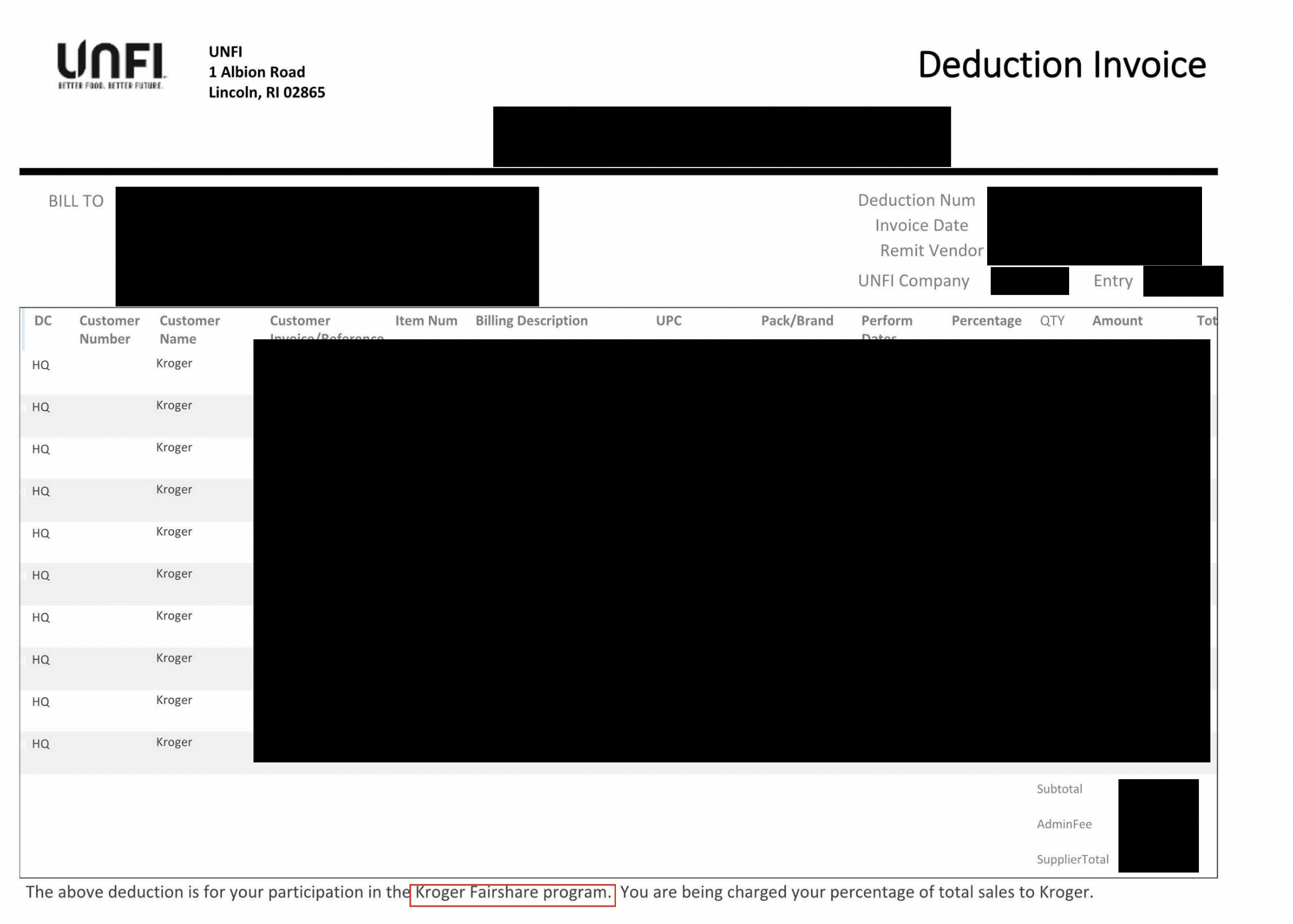
Operations related charges
Moving goods from thousands of vendors to retailers across the country is complex and expensive. To account for the complexity of dealing with logistic costs and compliance failures, UNFI charges a series of fees and allowances.
Tracking these charges over time can be helpful in measuring your cost to serve and provides a helpful measuring stick for how your operations team and logistic partners are performing.
Shortships
When you short-ship goods UNFI will you back for the goods that weren’t delivered at UNFIs list price.
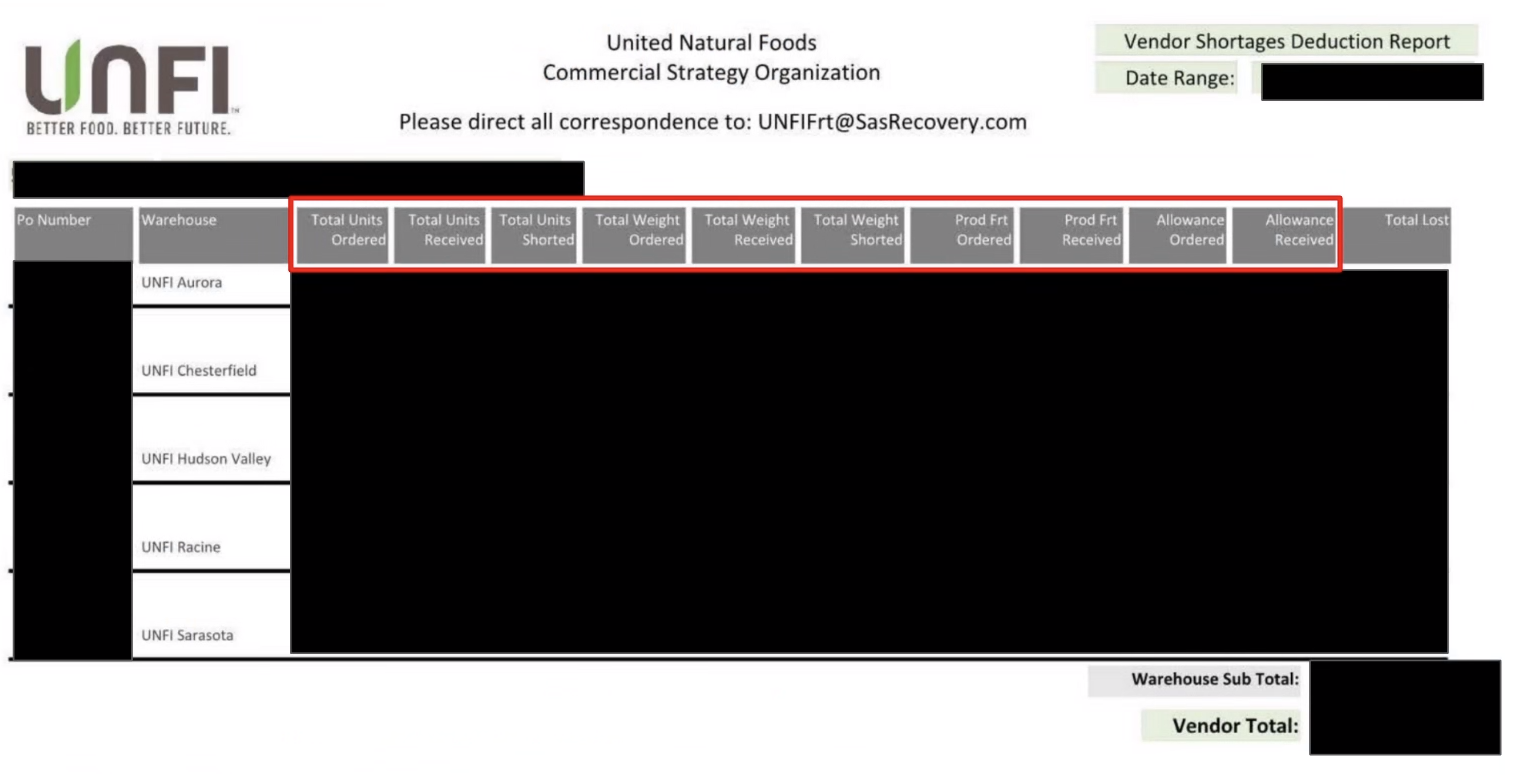
In the event that you short ship during a deal period, UNFI will bill you for the discount that would have been owed for the goods that weren’t shipped. For example, if UNFI ordered a 1000 units during a deal period with a $1 off, off invoice discount, and you are only able to ship 900 units. They will bill you for the $100 difference.
When you short ship prior to a price increase, UNFI will bill you back for the difference between the new price and the lower price on the current inventory UNFI has on hand.
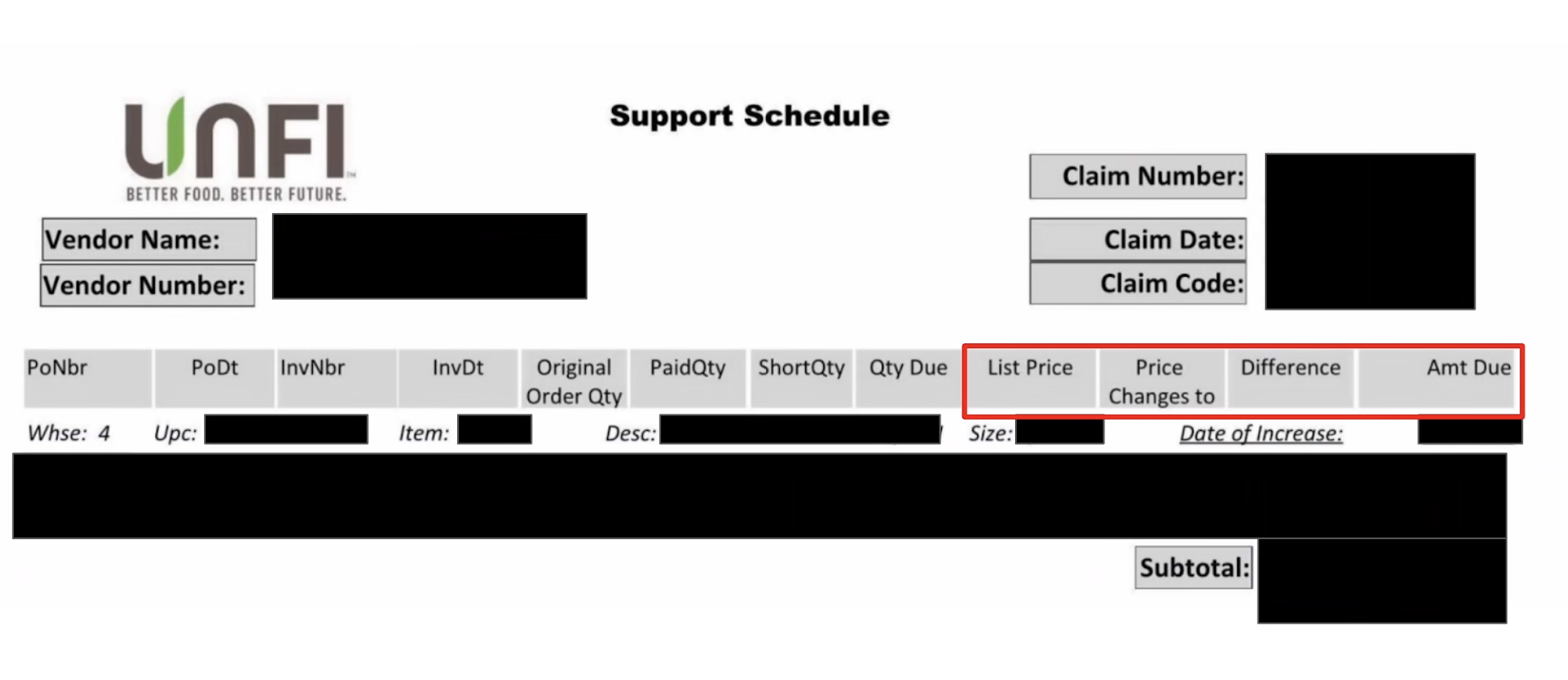
In the event that UNFI picks up goods from you and you aren’t able to provide them with the full order amount, they will also charge you for underutilized truck space with a freight audit deduction.
Example
Traditionally UNFI has charged a 3% service level fine on shorted goods when a brand fails to meet a 95% fill rate on open orders for two or more consecutive calendar weeks.
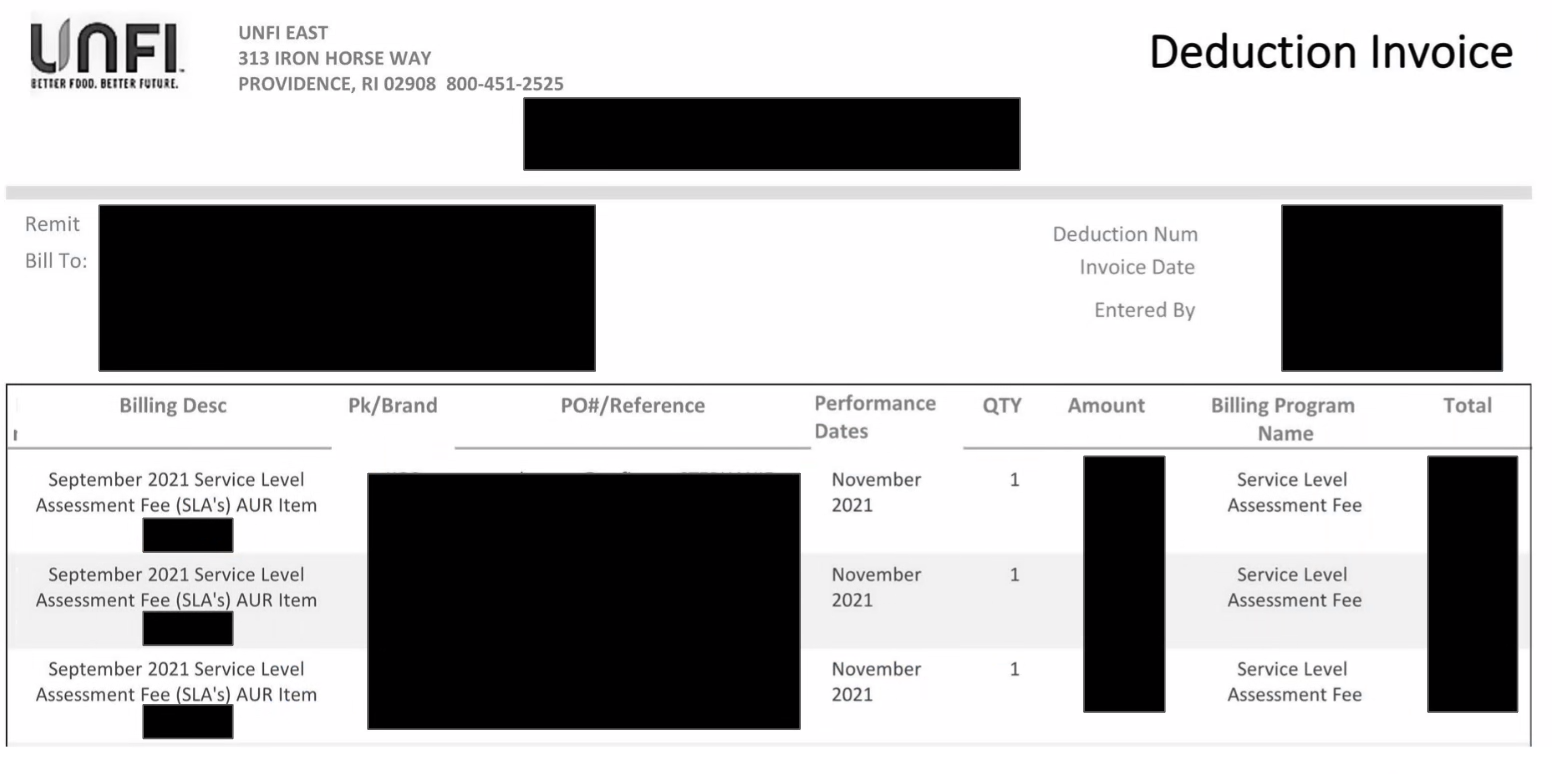
Overship Charges
In the event that you ship too much to UNFI, they will take a 35% off-invoice discount deduction off the goods if they elect to sell them.
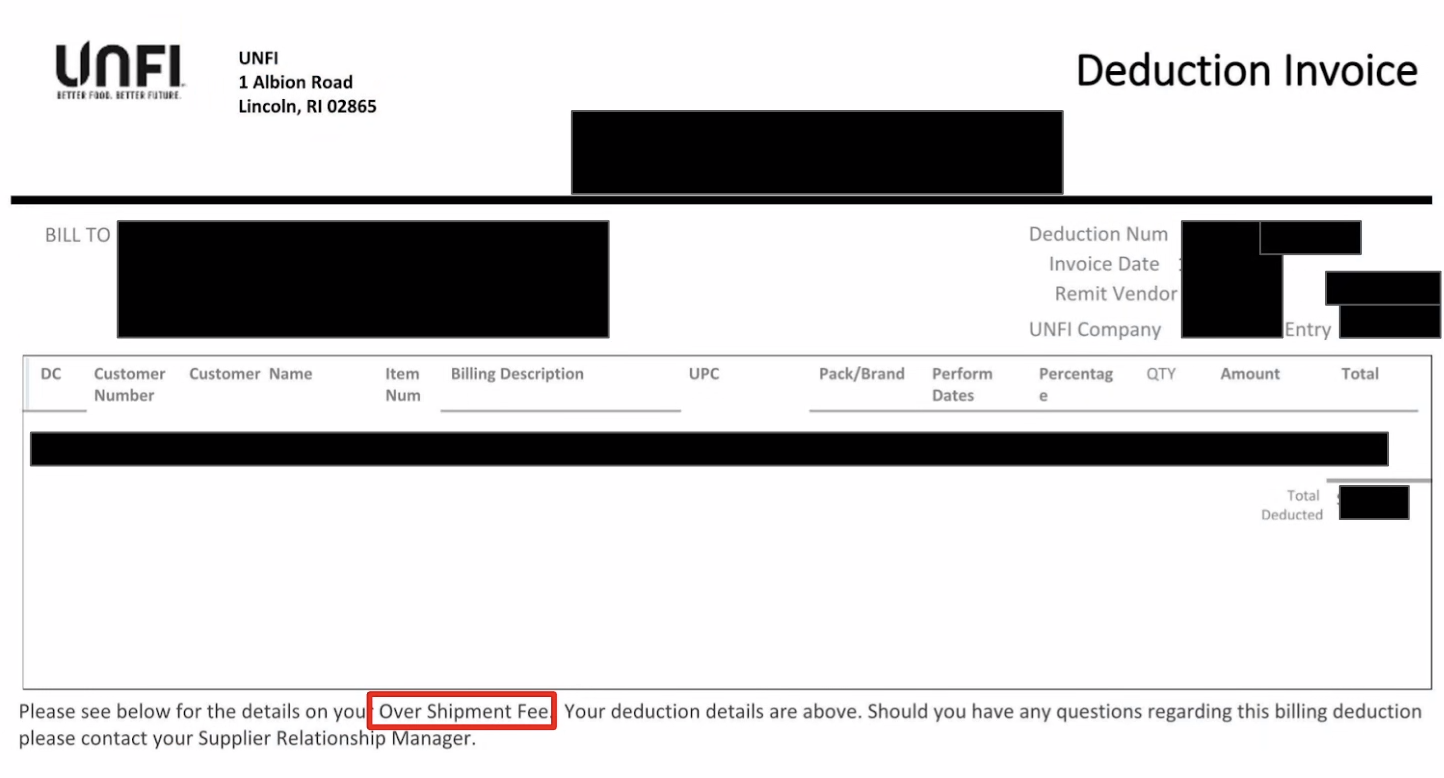
Late Fees
If goods arrive late to a UNFI distribution center they will charge a sliding scale fee depending on how late the goods arrived.
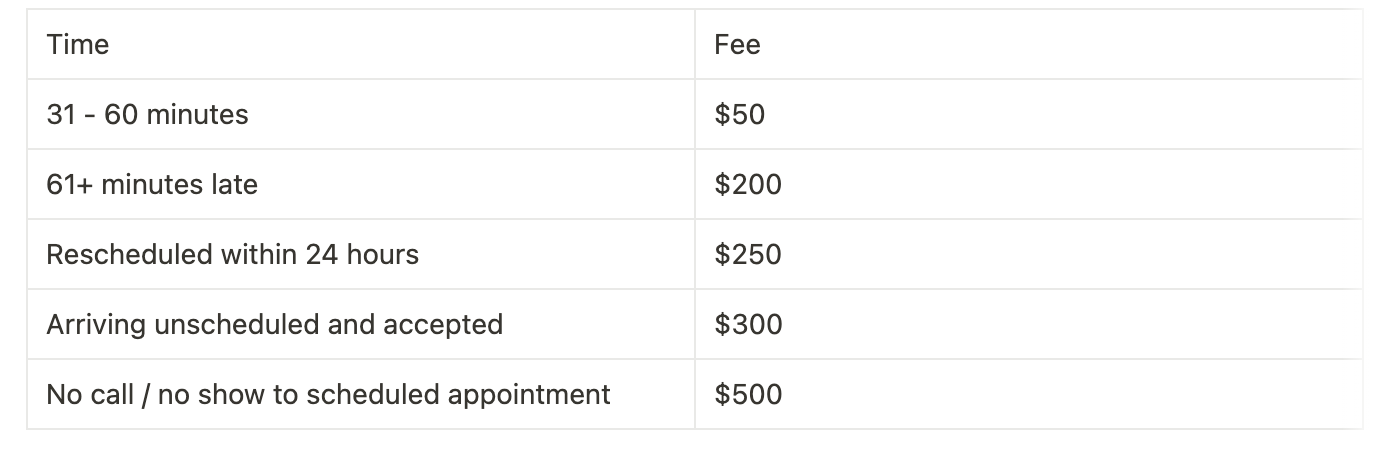
Spoilage, Damages and Returns
In the event that goods spoil or don’t have enough shelf life to be sold on retail shelves, UNFI will you back for the goods or allow you to pick up the goods from the distribution center. You can track inventory at risk of spoiling via ClearVue if you pay for the service.
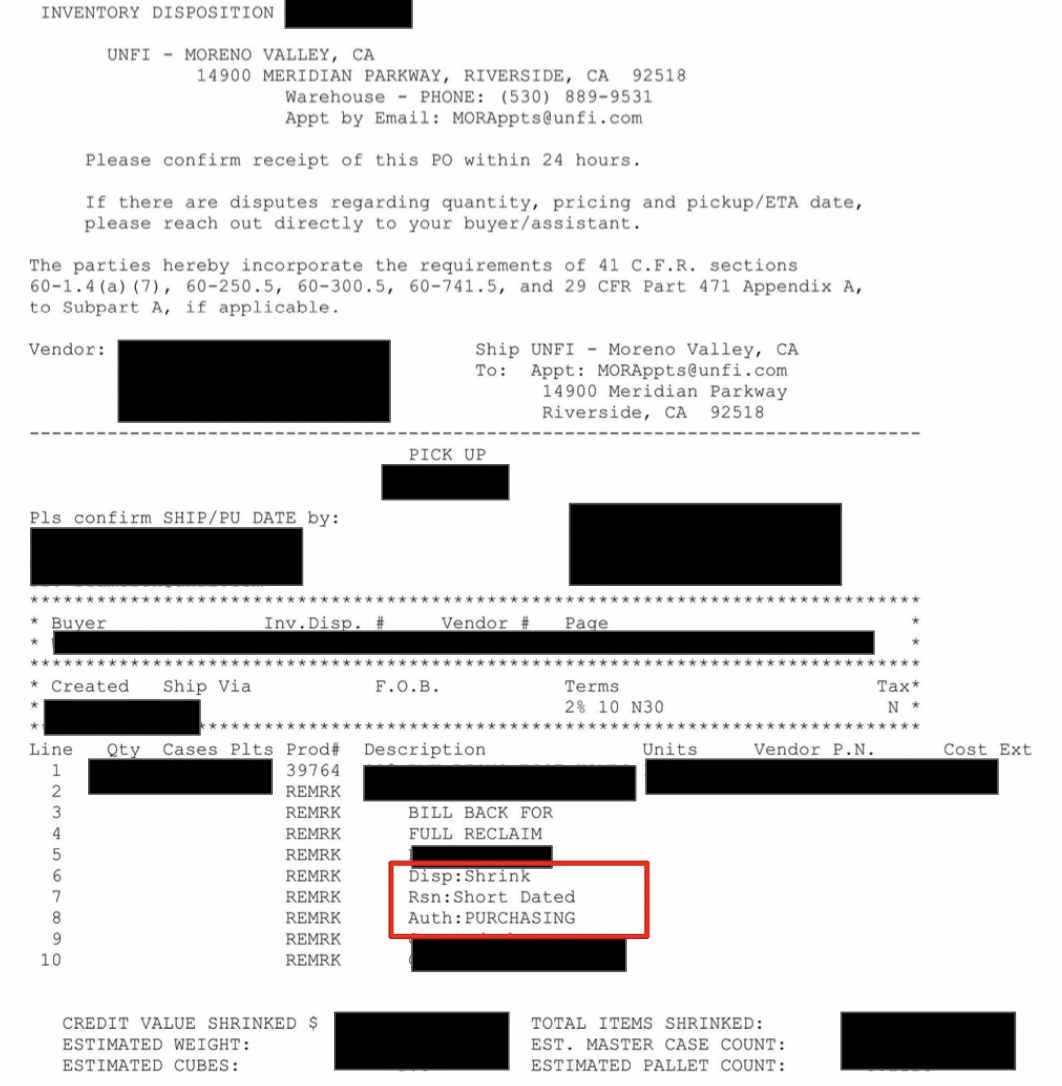
Freight Allowances
If you opt to have UNFI pick up the goods from you they will ask you to opt into a freight allowance to help support the cost. Freight allowances can vary depending on the particulars of your brand.
example
Pack Changes
Executing a pack change with UNFI can be incredibly expensive if not carefully managed. UNFI charges a sliding scale fee depending on how much notice is given. We’ve included a table below with fees by notice given. Note these fees are per SKU / per DC.

Recalls
In the unfortunate event that you need to recall a product, UNFI will charge you $3,000 base fee to execute the administrative work of executing a recall. UNFI will also charge fees to dispose of the goods as well.
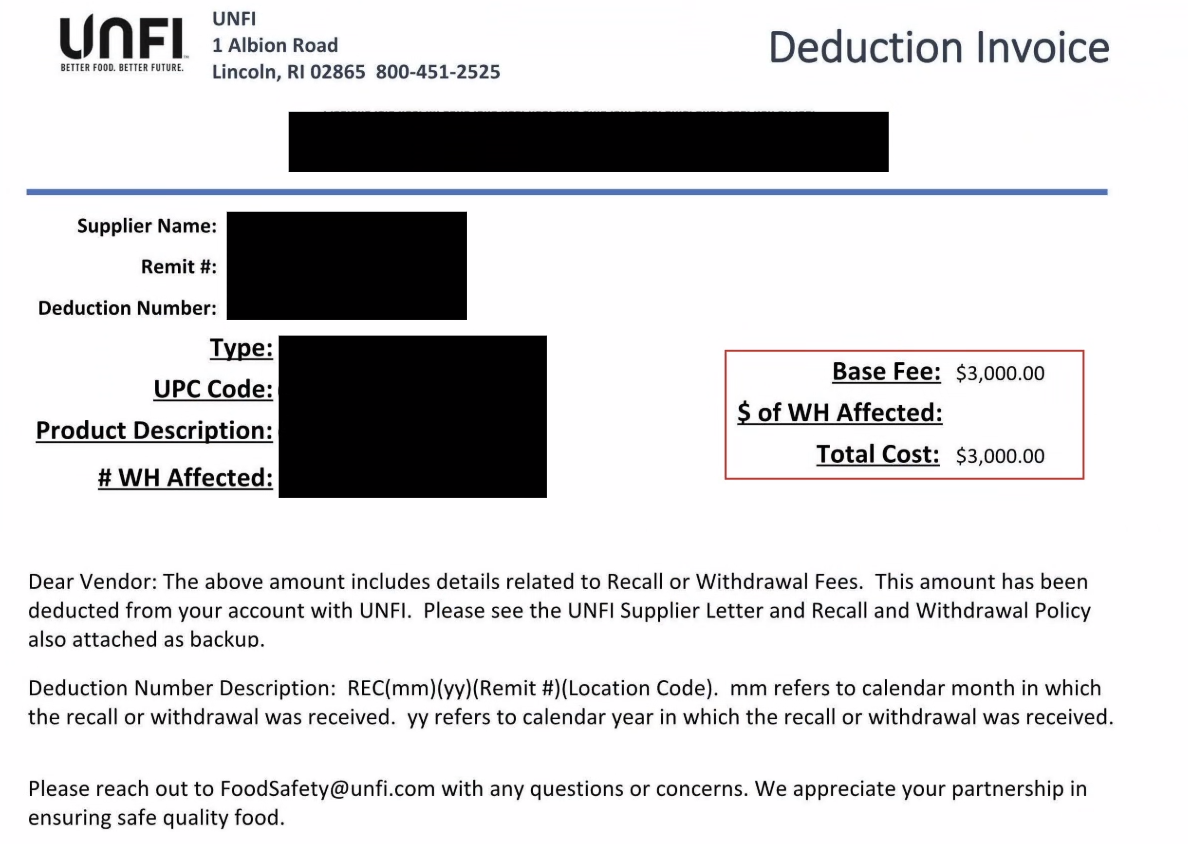
Discretionary(ish) Costs
There are a wide variety of programs offered by UNFI to support growth. We recommend brands treat these as investments and think about whether they’ll drive ROI.
Off-invoice discounts (OI)
Discounts that are given directly to the distributor, to incentivize distributors to purchase product prior to a busy period, or discounts if they purchase during a certain period. These do not get passed onto customers, so it doesn't necessarily grow top line revenue. OI’s are typically applied directly to the invoice rather than deducted separately.
Distributor Ad Programs
UNFI has several advertising programs to help promote your brand to retailer buyers. UNFI offers annual advertising plans that allow you to essentially prepay for access to the various marketing programs they offer. Alternatively, you can opt to participate a la carte in these programs.
Sell-through data / Simplified Supplier Approach (SSA)
Going into effect May 1st, 2024, UNFI will charge a flat fee of 2.5% of purchases for access to the critical data needed to optimize inventory and understand market trends.
Everyday Low Price (EDLP)
Ongoing Everyday Low Price strategy that offers consistently low prices on products without the need for frequent sales or discounts.
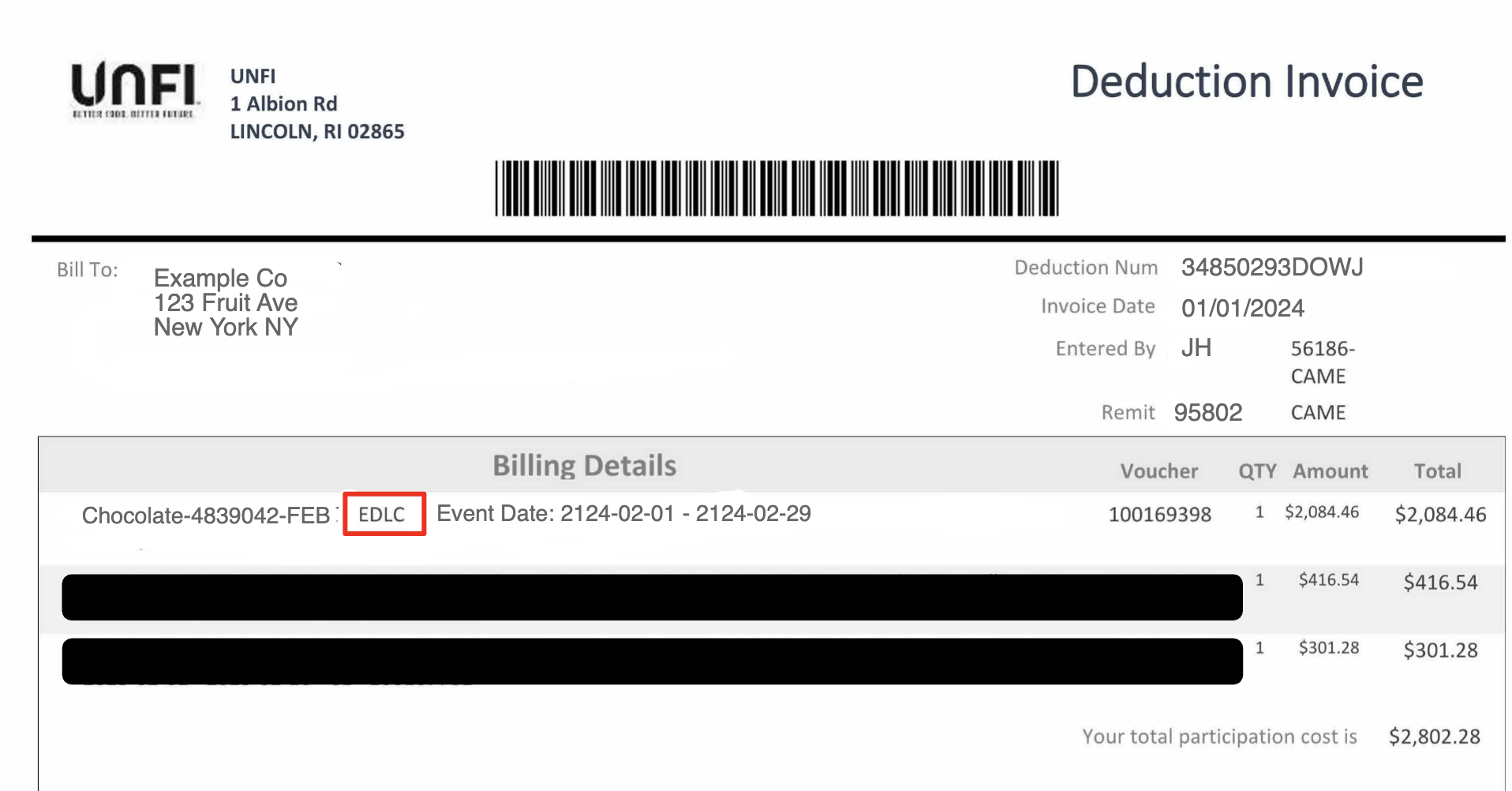
Scans
Discount taken at final point of sale, which often offers the most transparency since it is linked directly to a transaction.
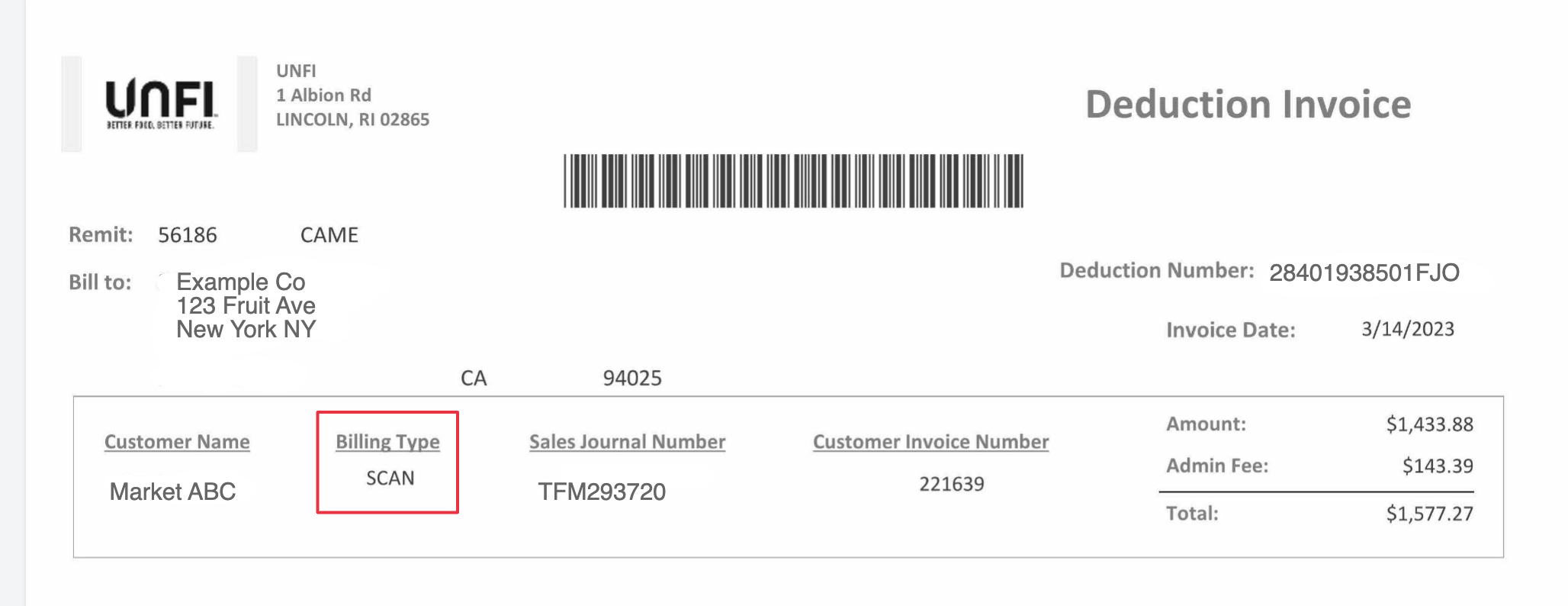
MCB
Discount that the distributor offers to the retailer, and passes the cost back to the brand.
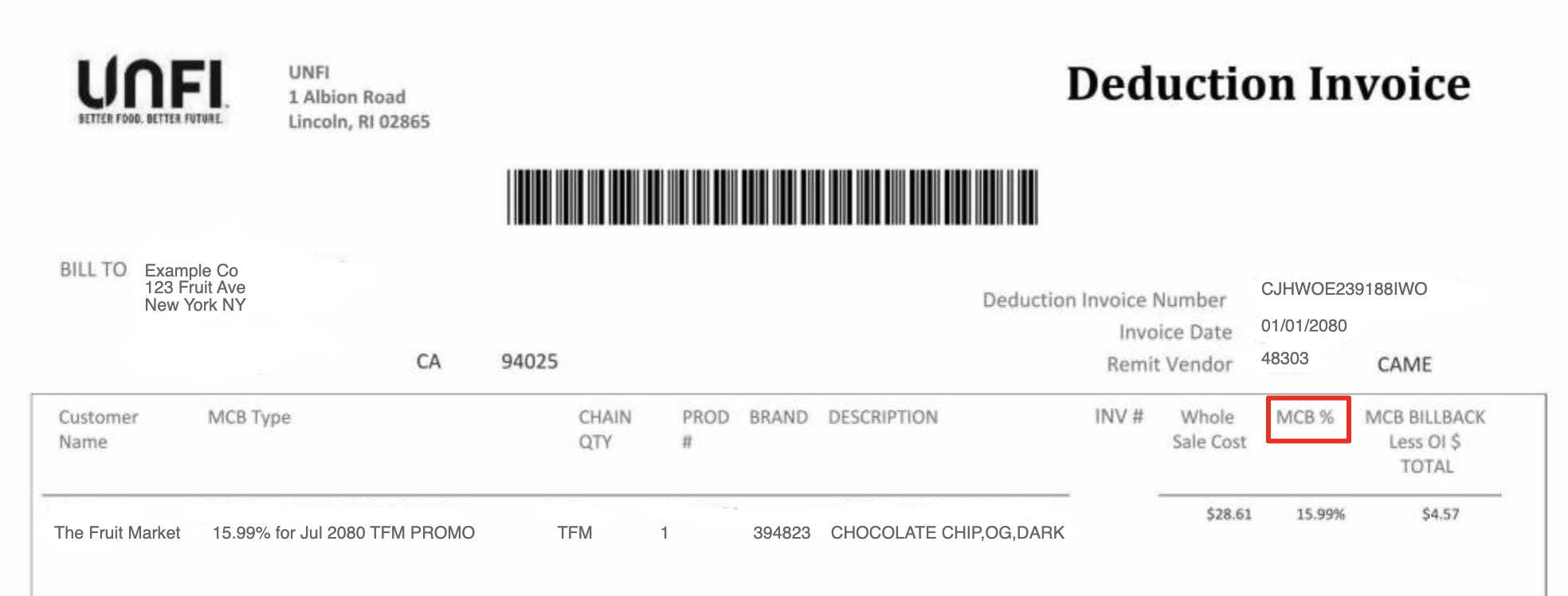
Common Mistakes
- Launching into more distribution centers than you’re ready for. The ability to launch into a distribution center does not equal the demand is needed to support having a product(s) in the distribution center.
- Forgetting to carefully plan for fully loaded costs at the start. It’s not uncommon for growing brands to spend 25%+ of revenue on the combination of distributor and retailer pass-through deductions. The percentage for new brands can often be significantly higher.
- Not treating ops-related distributor deductions as controllable. Charges related to late delivery, misconfigured pallets, e.t.c. can be driven down over time with operational excellence.
- Letting your deductions and trade go unmanaged can lead to pain down the road. As you scale, investors, lenders, auditors, and your own finance team will want to understand your gross margins and where you’re spending your trade dollars. To prevent having to play a massive clean-up game, it makes sense to invest in a tailor-made CPG cash and deduction management software.
Confido can help.
Confido specializes in Cash Application and Deduction Management, helping CPG brands automate their deduction process and build collaborative workflows around existing processes. Confido’s native dispute tool automates support gathering and dispute submission to recover invalid chargebacks, and acts as a central source of truth for all cash management. Contact us today to see how you an improve your cash application and deduction management process.


Explore More Resources







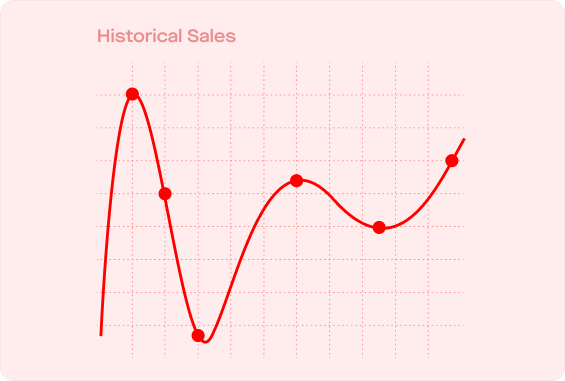

.webp)
.svg)
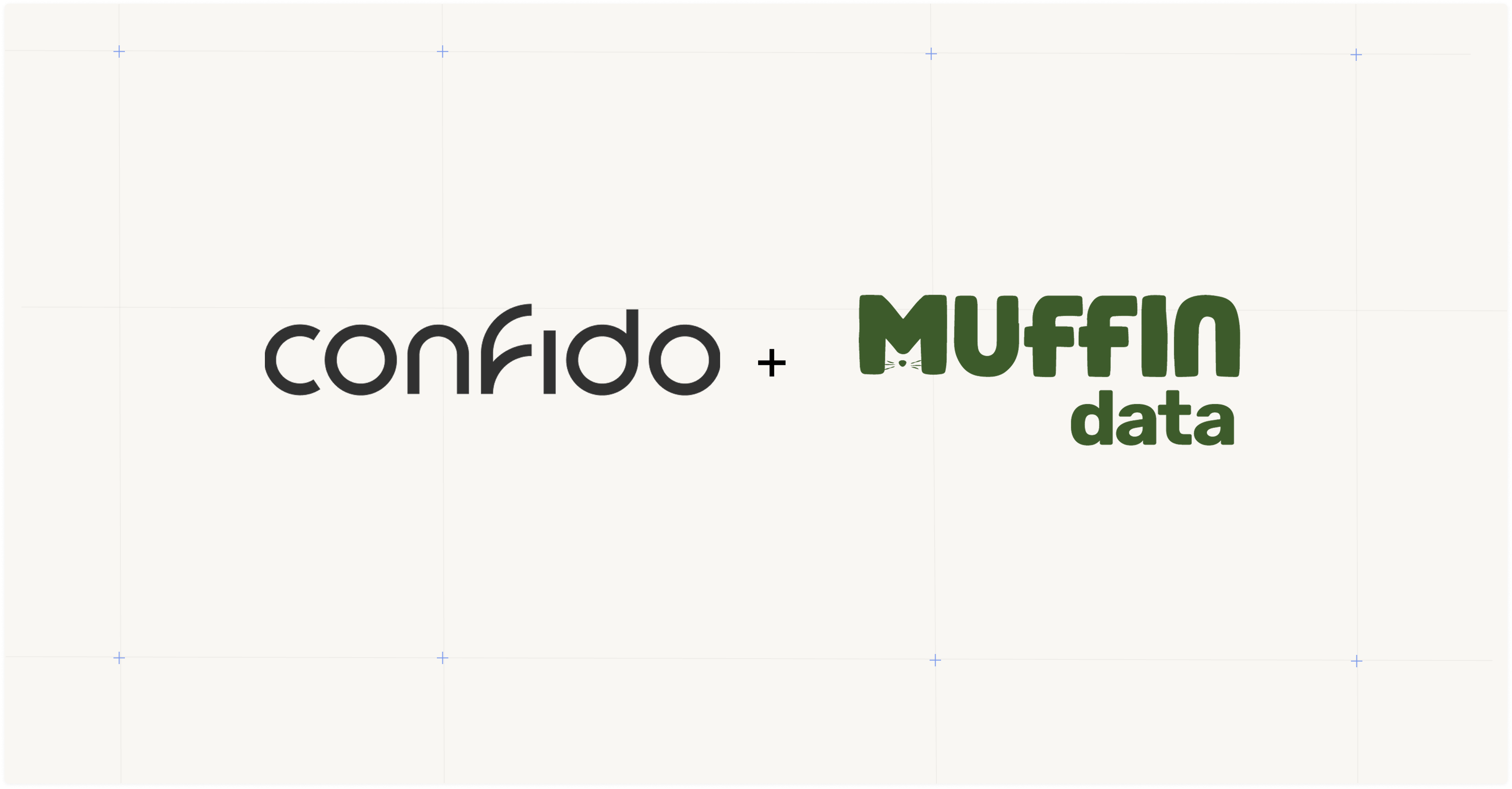
.png)


